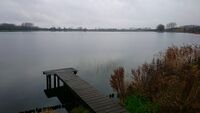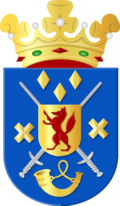Grand Duchy of Klinkenberg
This article refers to a micronation or element of micronationalism which is defunct and no longer exists. You can help make the article reflect that or ask on the talk page for further information. |
Grand Duchy of Klinkenberg | |||||||||
|---|---|---|---|---|---|---|---|---|---|
| Capital and largest city | Hûnestrân | ||||||||
| Official languages | Dutch, | ||||||||
| Government | Monarchy | ||||||||
• Grand Duke | Shady Morsi | ||||||||
| |||||||||
'
Klinkenberg, was a small island nation located in the Klinkenbergse plas. It was de facto a constituent country of the Wallenian Realm.
History
In 2014 this small patch of land was given by Viadalvia to the Schalamzaar Empire as a gift. However, Schalamzaar renounced this claim and the claim was vacant until 2017, when it was claimed by Yakklam.
Under a personal union with the Kingdom of Wallenia, the monarch was simultaneously monarch of Wallenia and also represented Klinkenberg internationally, day-to-day matters were delegated to a Wallenian plenipotentiary for Klinkenberg affairs based in Kronstadt.
On May 5, the Kingdom of Wallenia annexed the grand duchy.
Klinkenberg
The island was a core part of the now defunct Principality of Yakklam. Seeing an opportunity to expand Wallenia, negotiations between the Prince of Yakklam and the King of Wallenia happened on April 26. During this time, Yakklam ceased to exist as an independent country and was reformed into Klinkenberg.
On May 5, the Wallenian House of Delegates voted to annex the Grand Duchy due to the lack of interest in the project. To secure Wallenian interest in the region, Grand Duke Joseph avoided signing the law but signed the Annexation Bill into law.
Government
Klinkenberg was an absolute monarchy with the rule of decrees, with the King of Wallenia serving as its head of state and head of government. This was due to the small size of the nation and its small population.
Klinkenberg does not have a parliament but has an advisory general council. The GC consisted of between 2 and 4 councillors. The councillors served for four-year terms, and were appointed by Wallenia's government. While 2 councillors were elected to represent Klinkenbergs 2 parishes, Klinkenberg did not have a judiciary and their court was the Supreme Court of Wallenia.
Foreign relations
From the start, despite Klinkenberg being an equal member of the Wallenian Realm, outsiders saw Klinkenberg as little more than a puppet state dependent entirely upon Wallenia. This was confirmed when Wallenia annexed the grand duchy. The Wallene government however denied this accusation, as Klinkenberg is not a part of Wallenia. However, Wallenia also reported that they are helping to re-construct Klinkenberg and to help it develop and grow. Once Klinkenberg is developed enough, Wallenia had plans to release it as an independent state. However, the lack of interest in an independent Klinkenberger state made it very hard to govern.
Economy
Klinkenberg had no constitution or organized economy and shared its economy with Wallenia. In its 7-day existence, Klinkenberg received diplomatic recognition from only Wallenia, Mahuset and Viadalvia.
Geography

Klinkenberg is a 91 by 53 feet (27 by 4 m) island in the Klinkenbergerplas. It is the most northern region in Wallenia. The island is mainly hilly and unlike the Waal it is mostly inaccessible. However, it is a tidal island around low tide, and Klinkenberg can be reached on foot from the Dutch side of the Klinkenbergerplassen via a narrow muddy isthmus, making the island have a de facto border with the Netherlands. Another area is underwater (which is also claimed by Wallenia) as the Lordship of Atlantis Magis. The island has several dikes and trees, and is a natural protected area. It is a prohibited area for ships in both Dutch and Wallenian law (also for recreational boats) to dock.
Klinkenberg is the most natural place in Wallenia. Animals such as the Eristalis horticola, the Aglais io and Succinea putris are native to Klinkenberg. Other species that are in Klinkenberg are dogs, due to Klinkenberg bordering a dog beach

